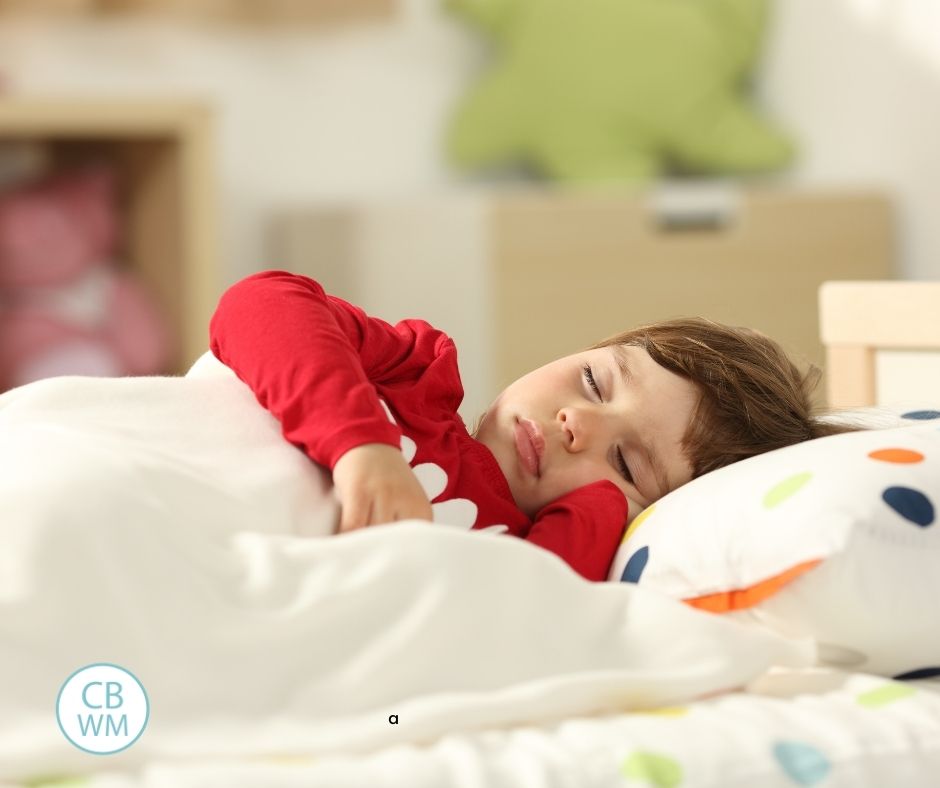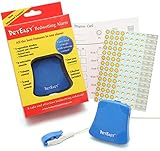Find out why some kids struggle with bedwetting and what is normal. Learn the signs of readiness and how to do nighttime potty training.

Potty training is simultaneously one of the most exciting and stressful events for a parent of a toddler or preschooler.
Every parent is excited to be done with diapers. They cost money and can be a pain to change.
But it can be really hard to teach a child to use the bathroom.
Then the day comes when you have success! Your child uses the bathroom consistently and daytime potty training has been overcome!
The next big milestone is nighttime potty training. In this post we will address bedwetting, what age a child can potty train at night, signs of readiness, and ideas for how to accomplish overnight potty training successfully.
Post Contents
- Bedwetting Can Be Normal
- Physiological Reasons for Wetting the Bed
- Lifestyle Reasons for Wetting the Bed
- Age Appropriate Expectations
- Signs of Readiness
- Daytime Potty Success
- Nighttime Milestones
- How to Potty Train at Night
- Prep Ahead
- Evening Hours
- Provide Positive Reinforcement
- Try a Dream Pee
- Use a Bed Wetting Alarm
- Conclusion
- Related Posts
Bedwetting Can Be Normal
The first thing to know and accept is that bedwetting at night (known as nocturnal enuresis) can be very normal for many years. It is generally accepted that it is completely normal to wet the bed until age 5. Your pediatrician likely will not have any concern over bedwetting until age 7.
Physiological Reasons for Wetting the Bed
A major reason for wetness at night is that your kiddo just isn’t developed enough to make it through the night.
This can happen for a few reasons:
- The bladder is not large enough to hold urine all night long
- Lack of muscle control to prevent the body from releasing urine
- Immature brain. The brain has not developed to the point of sending brain signals to the bladder to “hold on” to that pee OR to signal the body to wake up to use the bathroom
- Your child is a very deep sleeper. Most heavy sleepers will not stay dry through the night until they are much older
- New teeth or sickness can interfere with your child at night
These physiological reasons are typically genetic. Chances are if you or your spouse wet the bed beyond the toddler years, you will have a child who does the same.
Lifestyle Reasons for Wetting the Bed
While there can be physiological reasons for wetting the bed, it is possible there is something going on in your kiddo’s life causing the bed-wetting.
- Big transitions in life. If there is a new baby, a vacation, or a big move, kids can get stressed and either start to wet the bed or just not move past wetting the bed. If this happens, go back to diapers or pull-ups until the transition is settled
- Overreliance on diapers or pull-ups. Your kiddo might just need to ditch these for a few nights and sleep in underwear to get it
- Constipation can cause your child to wet the bed. While this could be considered physiological, constipation is often the cause of something happening in your daily routine (or not happening), so I am putting it here
If your child does not yet have dry nights, do not make it a thing. Do not punish or get upset. This will likely just prolong the issue.
If you are concerned, it is always wise to talk to your child’s doctor. I would tell the doctor at your next well-check even if you are not concerned. This way, it will be tracked as your child gets older.
Age Appropriate Expectations
As I mentioned, it is very normal for a child to not achieve night time potty training until age 5-7 years old.
You might see nighttime potty training success as young as two years old. That is definitely possible.
But your child needs to have developmental readiness as discussed above. You can’t rush developmental readiness.
Your kiddo also needs to have been daytime potty trained for a period of time before being able to achieve nighttime dryness.
Daytime and nighttime potty training are two very different things. Your child has little to no control at night.
Signs of Readiness
You never really know if your child is ready for nighttime potty training unless you give it a try. You do not want to try until you have some reasonable signs of readiness. Watch for the following before you start.
Daytime Potty Success
You want to see some significant success in daytime potty training before you even consider it in the night.
- Daytime accidents no longer happen or are rare. If your child cannot go without accidents in the day while she is conscious, it will be pretty impossible at night while she is asleep.
- Can stay dry during the day for two hours. You want to be sure your child can hold her urine and stay dry for 2 hours in the day before expecting her to go 10-12 hours at night.
- Can use the bathroom independently. Some children will sleep through the night and hold it all night, but others will need to get up in the middle of the night to use the toilet. You want your kiddo to be able to be independent with going potty.
- Daytime potty training has been solid for a while. Some people say to wait as long as 6 months of solid daytime success before moving to night training. I don’t think you have to wait that long, but if you do, you should have success unless there is a physiological reason otherwise. I would give it at least two weeks of solid daytime success before moving to nighttime. Brayden did night and day at the exact same time, but my girls all did night after day was solid.
Nighttime Milestones
If your child has met these milestones at night, you have an excellent chance of having success for overnight potty training.
- Your child has moved out of the crib. Your kiddo will not be able to get up and use the bathroom in the night if she is in the crib. Everyone needs to use the bathroom in the night at times, so this needs to be an option for young children for when it is needed.
- Your little one is waking dry in the morning. When your child gets up in the morning, she has a dry diaper or pull-up. If this happens at least three nights in a row, it is a good sign of readiness.
Another solid sign is if your child expresses interest in being nighttime trained. If she starts asking to wear underwear at night, give it a try.
How to Potty Train at Night
Once you feel like your child is ready to try to potty train at night, your first thought might be…how???
Here are some important tips and tricks to make this process easier.
Prep Ahead
I always find it helpful to give my children a heads up before things in life change. Give fair warning that you will be removing the diaper or pull-up before you do it. They will process this information and be more ready for it.
I would also recommend nightlights to light the way from the bedroom to the bathroom and in the bathroom. You do not want your child to avoid going potty because she is afraid of the dark. You also do not want her turning all of the lights on and waking herself up fully in the middle of the night.
It is also wise to do some practice runs. Have your child lie in bed (during the day) and practice getting up from bed and going to the bathroom. Let your child know it is okay to do this. You want to also give some rules and boundaries for what is okay and isn’t okay at this time.
Once a child has the freedom to get out of bed for the potty, they usually try getting out of bed as often as possible during naps and bedtime.
>>>Read: What To Do When Your Toddler/Child is Getting Out of Bed
You can help make the process less frustrating for yourself if you are ready for accidents. Make sure the mattress has a good protector on it that will keep it dry.
Many parents like to layer sheets on the child’s bed and will even put a protective pad between each sheet layer. That way if the child wets the bed, you can quickly change the sheets in the night.
Accidents do not necessarily mean it is not the right time. I had one child who needed to have a few nights of accidents before she woke up dry one morning and never looked back.
Evening Hours
In the evening hours, limit liquids leading to bedtime. You especially want to avoid sugary fluids. I would recommend just water close to bed. Many parents find success by limiting fluids 1-2 hours before bedtime. This does not have to go on forever; you just need to do this while your child is learning and developing the skill.
You also want to make going potty part of the bedtime routine. If your child can’t cooperate to use the potty when getting ready for bed, your child isn’t ready to be night trained.
Many parents find success if they have their child go potty 30 minutes before bedtime and right at bedtime, but you might only need to do right before.
Provide Positive Reinforcement
Let your child know that it is okay if there are accidents. It is normal to have some accidents as your child learns.
If you feel it is needed, at some point you could try positive reinforcement. You could have a sticker chart they fill in if they wake up dry or you could have a treat or a prize they get if they stay dry for a certain number of nights.
Most kids don’t need this incentive unless they are simply being lazy in the night.
Try a Dream Pee
If your child struggles to stay dry in the night, try a dream pee. This si like a dream feed idea.
You get your child up right before you go to bed and have her use the bathroom. You try to keep her as sleepy as possible.
Most accidents will happen in the first few hours of falling asleep, so a dream pee can help prevent wetting the bed for some kids.
I would recommend only doing this if you find it is needed.
Use a Bed Wetting Alarm
Bed wetting alarms can be very effective to help teach the body and brain habits to wake up when the child has a full bladder. These can be very effective for night potty training.
These work by sounding an alarm as soon as bedwetting occurs. This wakes the child and trains the body to wake when the need to pee happens.
We had one child who needed to go this route. It worked very well! We used this bedwetting alarm.

Conclusion
Related Posts
- Babywise Mom Potty Training Method
- Potty-Training Using the “Oh Crap!” Method
- How To Get Your Little One To Pee or Poop on the Potty
- Potty Training and Accidents
- Help a Reader Out: Potty Training at Night

